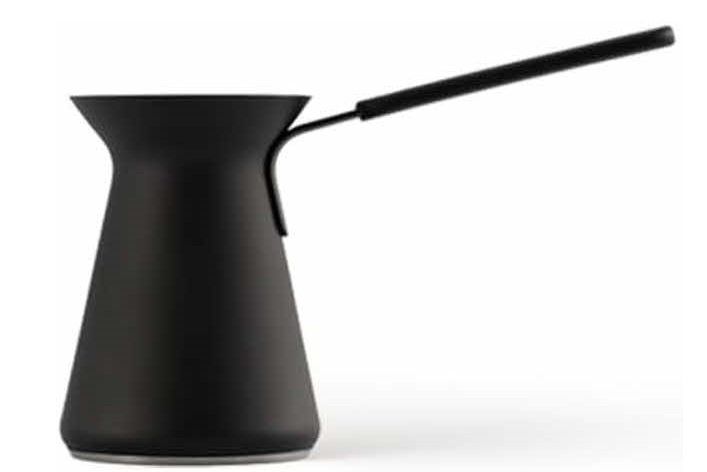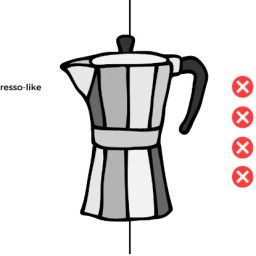
Brewing Turkish coffee is an art, steeped in tradition and rich in flavor. This unique brewing method, cherished for centuries, offers a coffee experience like no other, with its strong aroma, velvety texture, and robust taste. However, the advent of modern induction stoves presents a challenge for aficionados of this ancient brew.
The quest for the perfect Turkish coffee pot that harmonizes with the fast, efficient world of induction cooking has become a journey filled with trial and error. Finding a pot that not only preserves the authentic brewing technique but also is compatible with induction stoves has been a notable dilemma for coffee enthusiasts around the globe.
Key Takeaways
- The Quest for Compatibility: The essence of brewing authentic Turkish coffee lies not just in the technique but also in the tools used. A pot not compatible with induction stoves can turn this quest for authenticity into a futile effort. The right induction-compatible Turkish coffee pot ensures that the tradition meets modern convenience without compromising on the coffee’s rich flavor and distinctive froth.
- Embracing Alternatives: Innovation offers a workaround in the form of induction plates, allowing traditional pots to be used on modern stoves. For those leaning towards convenience, automatic Turkish coffee makers designed for induction stoves are also a viable option, ensuring that the ritual of coffee brewing adapts to the rhythm of contemporary life without losing its soul.
- The Induction Advantage: Switching to induction cooking for your Turkish coffee not only aligns with modern kitchen technologies but also brings a host of benefits. Induction stoves are celebrated for their energy efficiency, reducing the time and electricity used in brewing. Safety is another hallmark, with induction technology minimizing the risk of burns and fires. Lastly, the convenience of quick and even heating ensures that every cup of Turkish coffee is brewed to perfection, making the process as enjoyable as the drink itself.
Choosing the Right Induction Turkish Coffee Pot
Selecting the perfect Turkish coffee pot for an induction stove is a delightful fusion of tradition and technology. Here’s a little brew of wisdom to guide you through the choices, focusing on material, size, and design, with a nod to a nifty solution for those cherished traditional pots.
Material Matters: The heart of the matter lies in the material. Not all metals are created equal when it comes to induction compatibility. Look for pots made from ferromagnetic materials like stainless steel, which ensures your coffee pot gets along well with your induction stove. But remember, the charm of Turkish coffee often comes from its traditional copper pots. If you’re not ready to part with tradition, don’t fret—there’s a workaround.
Size and Design: Size does matter, especially when it’s about brewing just the right amount of coffee. Turkish coffee pots, or ‘cezves,’ are designed to concentrate flavors in small quantities, making the size a crucial factor. A pot too large won’t give you that rich, foamy top, while one too small might not serve everyone. The design, particularly the shape and thickness of the pot, also influences heat distribution, crucial for achieving the perfect brew.
A Versatile Solution: Enter the Bialetti stainless steel plate, a game-changer for those who wish to stick to their traditional or non-induction-ready pots. This ingenious device acts as a mediator, allowing you to use any Turkish coffee pot on your induction stove. It bridges the gap, so to speak, enabling the magnetic field necessary for induction cooking. This way, you don’t have to compromise on the authenticity of your coffee experience due to the limitations of modern technology.
The Best Induction Turkish Coffee Pots
In the world of Turkish coffee brewing on induction cooktops, a few standout pots and alternatives bridge tradition with modernity. Let’s dive into some options that promise to enhance your coffee experience without compromising the essence of this rich tradition.
IMEEA Induction-Compatible Pot: This gem combines modernity with tradition. Crafted from stainless steel, it’s not just about the looks; it’s about performance. Designed to work seamlessly on induction cooktops, the IMEEA pot ensures even heat distribution for a perfectly brewed Turkish coffee every time. Its compact size makes it ideal for personal use or serving a small group, making your coffee ritual both intimate and indulgent.
DELARLO Stainless Steel Saucepan: While not your traditional Turkish coffee pot, the DELARLO stainless steel saucepan offers versatility. Its induction compatibility and larger size make it suitable for brewing Turkish coffee when serving a crowd. The stainless steel construction ensures durability and even heating, proving that sometimes, thinking outside the traditional pot can lead to delicious results.
Automatic Solutions: For those who love the idea of Turkish coffee but need the convenience of modern technology, automatic Turkish coffee makers are the way to go. One notable mention is the SAKI Electric Turkish Coffee Maker. It brings the traditional Turkish coffee brewing process into the 21st century without sacrificing the authentic taste. With features that mimic the traditional brewing method, including an “ember cooking function” to enhance the foam and aroma, this machine is a testament to how tradition can meet technology without compromise.
For Different Brewing Capacities: Whether you’re brewing for one or a gathering, there’s a pot out there for you. The Silk Road XXL Turkish Coffee Pot, highlighted for its large capacity, is perfect for those looking to brew multiple cups at once. Made from durable materials and designed with aesthetics in mind, it’s a gift-worthy item for any coffee enthusiast. On the other hand, the Beko Electric Turkish Coffee Maker offers a compact solution for smaller spaces or personal use, ensuring you don’t miss out on your favorite brew even in a tight kitchen.
Brewing Process
Brewing Turkish coffee on an induction stove is an art that marries the old with the new. Here’s a simplified guide to getting it just right:
- Finely Ground Beans: The soul of Turkish coffee lies in its powder-fine beans. Start with the finest grind you can achieve, as this is crucial for the distinctive texture and flavor.
- Water to Coffee Ratio: Generally, use one cup of water for each heaping teaspoon of coffee. Adjust according to taste, and remember, Turkish coffee is traditionally strong.
- Sugar to Taste: Add sugar according to preference at the beginning of the brewing process. This can range from none to very sweet. Stirring at this stage ensures an even distribution.
- Heating: Place your coffee pot on the induction stove. Start with a medium heat setting and watch closely. The key is to slowly bring the coffee to a foam, not a boil, to avoid bitterness.
- The Perfect Foam: Just as the coffee starts to foam, remove it from the heat. Let it settle, then return it to the heat. Repeat this process up to three times to achieve the quintessential foam layer atop your coffee.
- Serving: Pour the coffee into small cups, allowing the grounds to settle at the bottom. Enjoy the rich, aromatic experience.
Maintenance and Cleaning
Caring for your Turkish coffee pot ensures longevity and the continued joy of perfect brews. Here’s how to maintain different materials:
- Stainless Steel: These pots are generally dishwasher safe, making them convenient to clean. However, hand washing with a mild detergent can prevent water spots and maintain shine.
- Copper: Copper pots require a bit more love. Hand wash with a gentle detergent and avoid abrasive sponges. To maintain their luster, use a copper polish. Always dry thoroughly to prevent tarnish.
- Brass: Similar to copper, brass pots should be hand washed and dried immediately. Brass cleaner can be used for tarnish. Avoid dishwasher use to preserve the pot’s integrity.
FAQs
Is stainless steel compatible with induction stoves?
Yes, most stainless steel pots and pans work well on induction stoves. However, not all stainless steel is magnetic. To test compatibility, try sticking a magnet to the bottom of the pot. If it sticks, it’s good to go for induction cooking.
Can I use aluminum pots on induction stoves?
Aluminum alone doesn’t work on induction stoves due to its non-magnetic nature. However, some aluminum pots come with a magnetic base, making them suitable for induction. It’s all about ensuring there’s a magnetic layer for the induction to work.
Are Moka pots versatile across different heat sources?
Moka pots, especially those made of aluminum, are traditionally used on gas stoves. Yet, there are versions designed for induction stoves with a stainless steel bottom. For electric stoves, it’s important to use a heat diffuser to avoid damaging the pot or the stove.
Final Thoughts
Choosing the right Turkish coffee pot for induction stoves marries the rich tradition of Turkish coffee with the modern convenience of induction cooking. The key lies in understanding the compatibility of materials like stainless steel and aluminum with induction technology and appreciating the versatility of Moka pots across various heat sources.
Induction cooking, celebrated for its energy efficiency, safety, and even heating, brings a new dimension to brewing the perfect cup of Turkish coffee. It encourages coffee aficionados to explore and experiment with different types of pots, from traditional to modern automatic solutions, to find their perfect match.









